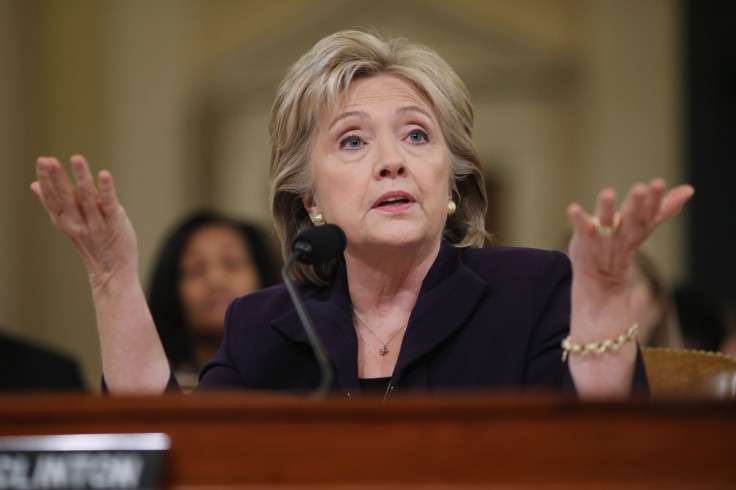Highlights from Hillary Clinton's testimony to the Benghazi hearing

As expected the 22 October testimony of Hillary Clinton in front of the House Select Committee on Benghazi was full of drama and spirited exchanges. The former secretary of state sparred with Republican members of the committee she and fellow Democrats believe launched the committee to derail her presidential campaign.
While Republicans looked to justify and give credibility to their investigation, Clinton hoped to defend her actions as secretary of state with as little damage to her campaign as possible. IBTimes UK breaks down the top five moments of the hearing thus far:
Rep. Trey Gowdy (R-South Carolina) vs. Rep. Elijah Cummings (D-Maryland)
Before the hearing could even get to Clinton's testimony, the panel's top Republican and top Democrat began a heated exchange over what information the committee should release. Trey Gowdy, the committee chairman, attempted to clarify that Clinton was "one important witness" "among hundreds," noted The Washington Post.
"Not a single member of this committee signed up to investigate you or your email," he said. Elijah Cummings retaliated with saying in his opening statement: "The truth, the whole truth, and nothing but the truth." He then repeated "The truth, the whole truth, and nothing but the truth."
Cummings continued a pointed attack towards Gowdy, who had claimed it was "impossible to conduct a serious fact-centric investigation" of the 11 September attack in Benghazi, Libya. He added: "The problem is that the Republican caucus did not like the answers they got from those investigations, so they set up this select committee with no rules, no deadline and an unlimited budget. And they set them loose, Madam Secretary, because you're running for president."
Clinton and her notes vs. Rep. Peter Roskam (R-Illinois)
Early on in the questioning, Illinois Congressman Peter Roskam noticed that Clinton turned to her aides seated behind her and received notes as he was talking. "... I can pause while you're reading from your notes from your staff," he said. To which, Clinton promptly responded that she could do more than "one thing at a time, Congressman, thanks."
Clinton's neglect of Ambassador Stevens's security needs
At several points during the testimony, Republicans on the panel tried to stress that Clinton had neglected Ambassador J Christopher Stevens's security needs in Libya. Stevens was one of those killed during the attack on the American consulate in Benghazi.
According to the New York Times, Representative Mike Pompeo listed the ways Stevens could have tried to reach Clinton if he had been given access. Pompeo asked if Stevens had her mobile number, fax number and home address. "No, he did not Congressman," Clinton responded, adding that ambassadors do not generally ask where she lives.
Pompeo then retorted that it was unfortunate that the ambassador did not have that information, as her friend Sidney Blumenthal, who frequently emailed her about Libya, did. "Mr Blumenthal had each of those and did each of those things," he said.
Clinton's defence on security
Pompeo was not the only member of the GOP to go after Clinton over security, with Gowdy questioning why security was reportedly so lax in Libya leading up to the attacks. Clinton said that she set up an independent Accountability Review Board that revealed 29 recommendations for improving security for US diplomats abroad. She said that both she and the ambassador knew that Benghazi was a dangerous place for Americans but that there had been no actionable threat received by US intelligence, CNN reported.
"No one ever came to me and said we should shut down our compound in Benghazi," Clinton said. She added that previous attacks on Americans, such as the 1983 attack on a US Marines barracks and the US Embassy in Beirut had led to changes in US security procedures.
Rep. Martha Roby (R-Alaska) vs. Clinton's emails
Martha Roby used her turn to quickly zone in on Clinton's emails, particularly an exchange between two staffers at the State Department's Libya desk who reportedly said Clinton asked whether the department had a presence in Benghazi. While Clinton claimed that she knew there were State Department staffers in Benghazi, Roby countered that the emails told a different story.
The Washington Post noted that the email exchange was printed out in a prepared booklet for Clinton and her questioners. Clinton on several occasions opted not to open the book despite the repeated attempts by Roby. After the heated exchange, Roby concluded her questioning with a comment: "We will certainly never know what the outcome would have been if there had been more agents that night."
© Copyright IBTimes 2025. All rights reserved.






















